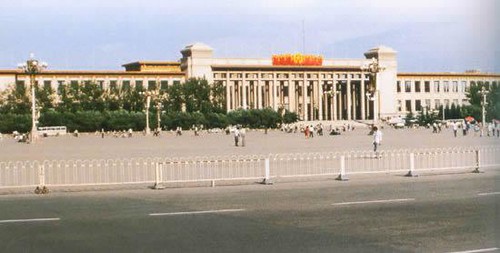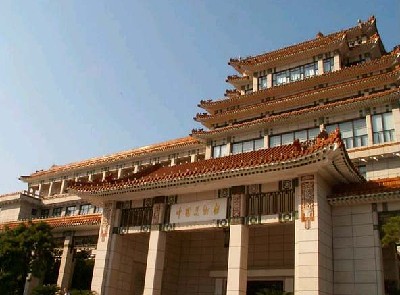| Home > Living in China > Kungfu |
What are Essentials of Taijiquan
1. Straightening The Head
Stand straight and hold the head and neck naturally erect, with the mind concentrating on the top. Do not strain or be tense; otherwise, the blood and vital energy cannot circulate smoothly.
2. Correct Position Of Chest And Back
Keep the chest slightly inward, which will enable you to sink your breath to the dan tian (lower belly). Do not protrude your chest, otherwise you will feel uneasy in breathing and somewhat "top heavy".
Great force can be launched onlly when you keep the vital energy in your lower belly.
3. Relaxation Of Waist
For the human body, the waist is the dominant part. When you relax the waist, your two feet will be strong enough to form a firm base. All the movements depend on the action of the waist. Inaccurate movements in taijiquan stem from erroneous actions of the waist.
4. Solid And Empty Stance
It is of primary importance in taijiquan to distinguish between "Xu" (Empty) and "Shi" (Solid). If you shift the weight of the body on to the right leg, then the right leg is solidly planted on the ground and the left leg is in an empty stance. The same is true with the left leg. Only in this way can you turn and move your body adroitly and without effort, otherwise you will be slow and clumsy in your movements and not able to remain stable and firm on your feet.
5. Sinking Of Shoulders And Elbows
Keep your shoulder in a natural, relaxed position. If you lift your shoulders, the qi will rise with them and the whole body will be without strength. You should also keep the elbows down, otherwise you will not be able to keep your shoulders relaxed and move your body with ease.
6. Using The Mind Instead Of Force
In practising taijiquan, the whole body is relaxed, and there is not an iota of stiff or clumsy strength in the veins or joints to hinder the movement of the body. According to taditional Chinese medicine, there is in the human body a system of pathways called jingluo (or meridian) which link the viscera with different parts of the body, making the human body an integrated whole. If the jingluo is not impeded, then the vital energy will circulate in the body unobstructed. But if the jingluo is filled with stiff strength, the vital energy will not be able to circulate and consequently the body cannot move with ease. One should therefore use the mind instead of force, so that vital energy will follow in the wake of the mind or conciousness and circulate all over the body. Through persistant practice one will be able to have genuine internal force. This is what taijiquan experts call "Lithe in appearance, but powerful in essence".
7. Coordination Of Upper And Lower Parts
According to the theory of taijiquan, the root is in the feet, the force is launched through the legs, controlled by the waist and expressed by the fingers; the feet, the legs and the waist form a harmonious whole. When the hands, the waist and the legs move, the eyes should follow their movements. This is meant by coordingation of the upper and lower parts.
8. Harmony Between The Internal And External Parts
In practising taijiquan, the focus is on the mind and conciousness. With the tranquility of the mind, the movements will be gentle and graceful. As far as the "frame" is concerned, there are only the Xu (empty), shi (solid), kai (open) and he (close). Kai not only means opening the four lims but the mind as well, he means closing the mind along with the four limbs. Perfection is achieved when one unifies the two and harmonizes the internal and external parts into a complete whole.
9. Importance Of Continuity
In taijiquan, one focuses the attention on the mind instead of force, and the movements from the begenning to the end are continuous and in an endless circle, just "like a river which flows on and on without end" or "like reeling the silk thread off cocoons".
10. Tranquility In Movement
In taijiquan, the movement is blended with tranquility, and while performing the movements, one maintains tranquility of mind. In practising the "frame", the slower the movement the better the results. this is because when the movements are slow, one can take deep breath and sink it to the dan tian. It has a soothing effect on the body and the mind.
Learners of taijiquan will get a better understanding of all this through careful study and persistant practice.
Art
 more
moreA Brief Look at China National
Main gate of China National Museum

China’s National Museum will Open
China's National Museum, under expansion for nearly two years, will

Magic Face Change is Soul of
Sichuan Opera, ChengduSichuan Opera (Chuan

Customs
 more
more



 print
print  email
email  Favorite
Favorite  Transtlate
Transtlate 
